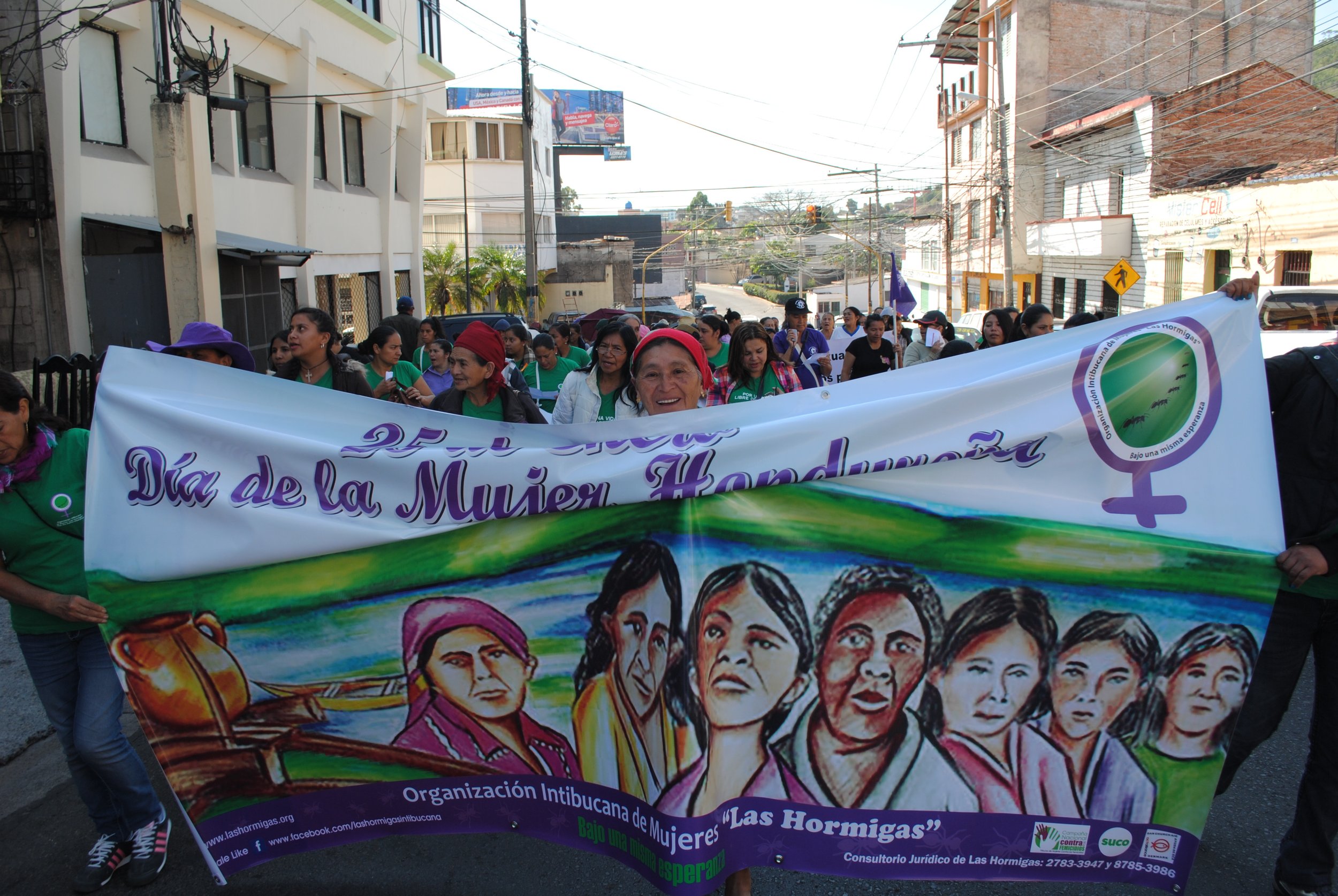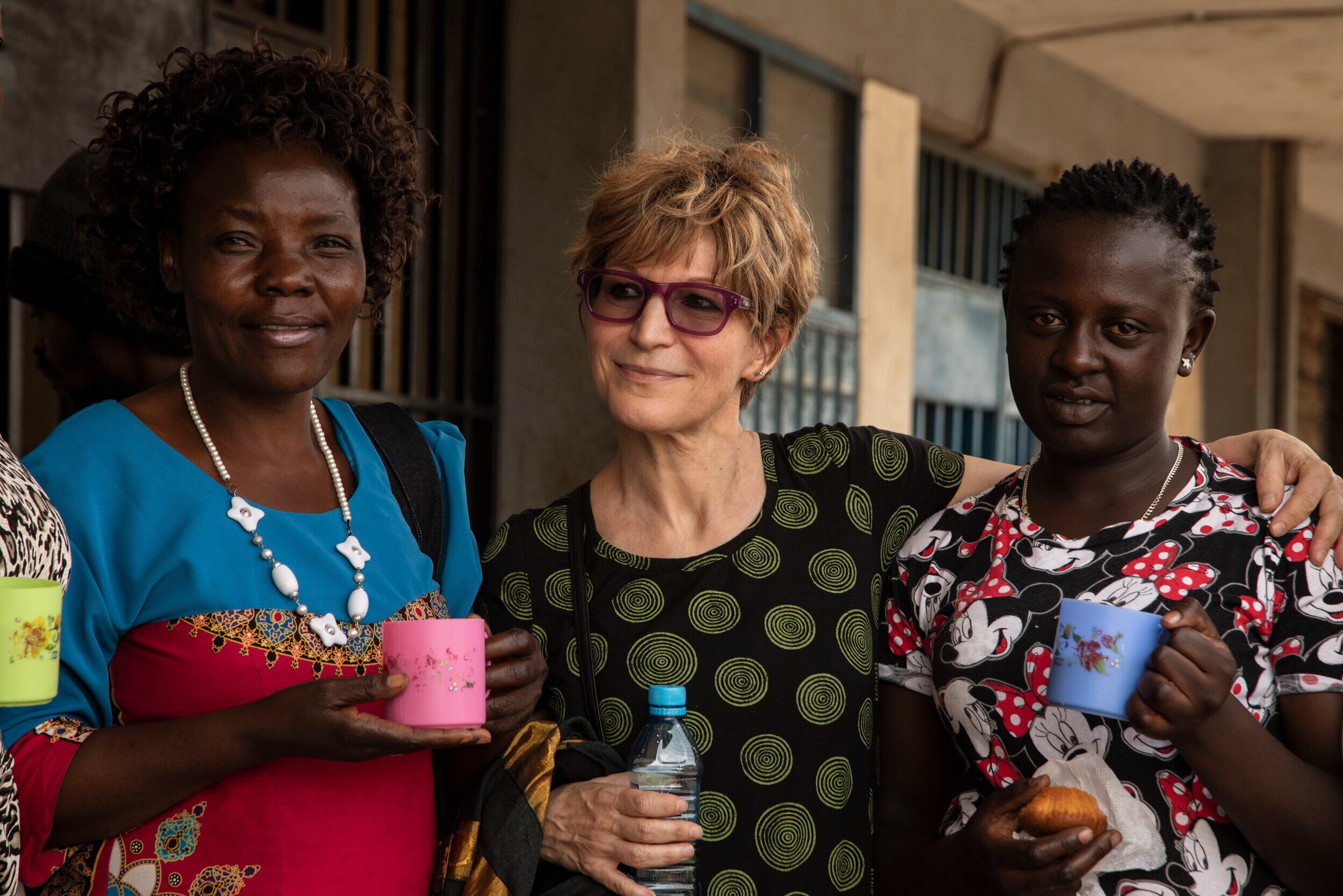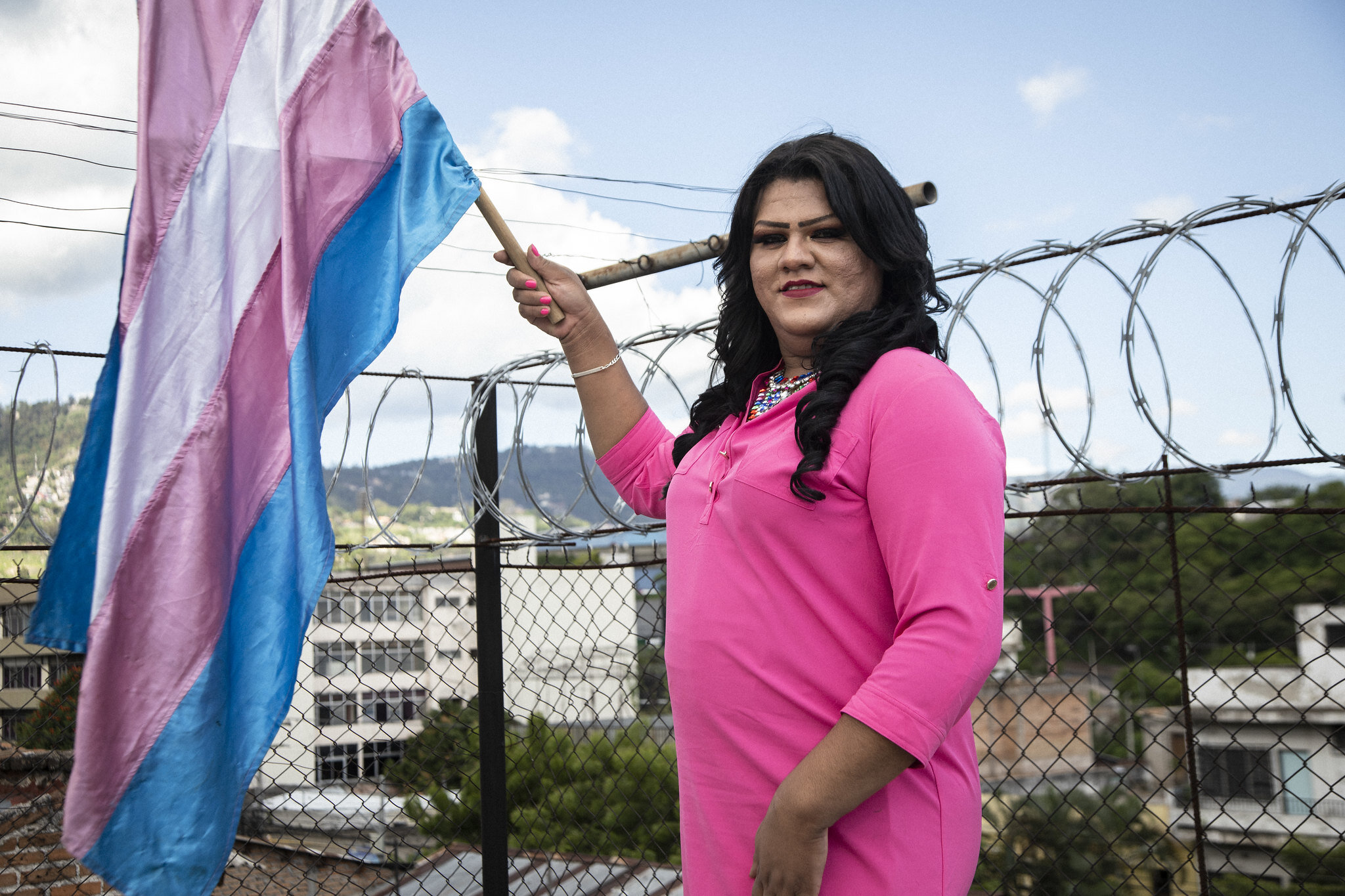
Women and LGBTQI+ defenders
Women and LGBTQI+ human rights defenders across the world are fighting for positive change in their communities.
They share many challenges experienced by their cis-male counterparts but face additional obstacles because they undermine the status quo twice over: through their work in its own right, and their implicit challenge to accepted gender norms in society.
As a result, they are even more vulnerable to threats, stigma, and violence. This can include attacks on their families, violent threats against them, or public defamation campaigns accusing mothers of neglecting their children or pursuing sexual partners.
This situation has become increasingly normalised by the use of misogynistic language by prominent political figures in recent years, while the concept of ‘gender ideology’ has emerged as a perceived threat to family values.
The statistics
In Mexico between 2010 and 2018: more than 48 women defenders and journalists were killed.
In Honduras, the LGBTI community has noted an increase in violence and crime against its members since the coup d’état in 2009. Between 1994 and 2008, 20 violent deaths were recorded, which multiplied significantly over the following six years. From 2009 until the end of 2014, there were 184 violent deaths.
In Kenya, between 2016 and 2024, more than 500 women have been victims of femicide. 14 of these murders happened in the first quarter of 2024.
In the first half of 2023, women activists amounted to one-quarter of human rights defenders who were attacked, while in the second half of 2023, the number of those murdered rose by 50% in comparison to the same period of 2022.
Almost half the human rights defenders PBI accompanies are women.
It is essential that states commit to ensuring a safe environment for all human rights defenders by implementing prevention and protection programs with a gender focus. This must follow the investigation of all cases of threats and attacks against women and LGBTQI+ defenders and condemnation of those responsible.
What does PBI do?
PBI provides direct protection and support to women human rights defenders to keep them alive and help their activism thrive. Our international volunteers accompany at-risk activists, standing shoulder to shoulder with them in a display of solidarity that deters violent attacks. We also provide longer-term support – from security monitoring and psychological assistance, to communications and capacity-building training.
This is paired with multi-level advocacy aimed at creating favourable security, policy and political environments for women defenders to work within. At a global level, we build networks that can be mobilised at short notice to provide much needed support.
We also provide defenders with a platform to amplify their voices, and ensure that their calls for rights and freedoms are heard by those who can make a difference.
Some of the WHRDs & organisations working for women's rights that PBI supports and protects
Colombia
Berenice Celeyta, NOMADESC
Grassroots Women’s Organisation (OFP)
Mexico
Alba Cruz, lawyer for the Integral Defence Committee for Human Rights “Gobixha” (Codigo-DH)
Organisation of Women Ecologists of the Sierra de Petatlán (OMESP)
Tita Radilla, of the Mexican Association of Relatives of the Detained-Disappeared (ADAFEM)
Guatemala
Honduras

Women human rights defenders
Valentina Rosendo Cantú
17-year old Valentina Rosendo Cantú lived in an isolated village in Mexico’s impoverished Guerrero state. One morning, soldiers surrounded her as she washed clothes in a shaded stream. An indigenous woman whose first language was Me’phaa, she spoke little Spanish - when she couldn’t answer their questions she was tortured and raped by two of the soldiers while the other six watched.
Despite knowing the serious risks of fighting back against impunity, Valentina reported the crime. She was referred to the military courts but she was too terrified to speak with the army - the case was shelved. That was in 2002. From that day on, Valentina fought to have her case heard in the civilian justice system.
As a result, she began to receive death threats. Her young daughter was attacked and two of her supporters from the Organisation of Indigenous Me’Phaa People (OPIM) were abducted, tortured and murdered. OPIM's leader, Obtilia Emanuel, had to leave the region for her safety.
Threats also forced Valentina’s lawyers from the Tlachinollan Human Rights Center to close one of their offices. PBI provides security support to the Center to enable them to continue their vital work representing survivors such as Valentina in their struggles for justice.
In May 2010, Valentina took her case to the Inter-American Court of Human Rights, and won. The court found her rights had been violated and ordered Mexico to end the use of military justice in cases where soldiers commit crimes against civilians. It also ordered the investigation of Valentina's case in a civilian court, taking into account a gender and cultural diversity perspective in the identification, judgement and sentencing of those responsible.
It would take Valentina another eight years to secure justice. Finally, on 1st June 2018, a local court in Guerrero emitted a guilty verdict against the military members responsible for the rape and torture Valentina suffered.
This is a paradigmatic case on a national and international level as it recognises the testimony of the victim as a fundamental probatory element and signals that crimes of this nature often occur without the posibility of access to witnesses. It sets a precedent for the development of the term "sexual torture" and "military institutional violence" and consolidates Valentina as a reference point in the defense of women's rights.
TZK'AT Network of Ancestral Healers of Community Feminism
The TZK'AT Network of Ancestral Healers of Community Feminism from Ixmulew is an organization of indigenous women defending life, women's rights, natural resources and territory, in different regions of Guatemala.The organisation was formed by 10 women human rights defenders in October 2015. Many members are part of other organizations and movements in defence of the territory, the rights of indigenous peoples and women.
These women defenders have a history of being politically persecuted, suffering stigmatization, death threats, territorial political displacement and criminalization as a result of their work in defence of these rights. Likewise, all of them have experiences of ancestral healing processes and in indigenous communities they work as healers, midwives, herbalists, etc.
PBI has accompanied the TZK'AT Network since February 2018.
Dina Meza
Dina Meza is a celebrated independent journalist and defender of freedom of expression. She is the director of human rights organisation ASOPODEHU, founder and current President of PEN Honduras, an organisation that supports journalists at risk.
She is also the founder and editor of the online newspaper ‘Pasos de Animal Grande’ where she publishes information on human rights violation and corruption in Honduras. In addition, Dina provides legal and educational support to at-risk professionals, journalists and social communicators. In 2007, she received the special Amnesty International UK prize for journalists at risk, and in 2014 she was awarded the Oxfam Novib / PEN International Freedom of Expression prize.
Due to Dina Meza’s high public profile and her classification as a dissident, she is unable to publish her work in the mainstream media. The Honduran state is actively censoring issues surrounding human rights abuses and state crimes. For this reason, she uses her online platform to draw attention to state violence against activists and human rights defenders. Her website to reach up to 30,000 hits a month. Her work focuses on supporting women, indigenous populations, youth groups, LGBTI communities and social communicators.
Dina has been involved in many high profile campaigns and actions. Following the contested elections in November 2017, Dina has provided extensive coverage of the excessive use of force by the Honduran state security forces against protesters. In 2016, she carried out in-depth reporting around the murder of high-profile environmental activist, Berta Caceres, and is part of the #Justice4Berta campaign. She also provides a platform to highlight lesser known struggles, particularly rural defenders and indigenous communities defending their land and environment against the devastating effects of economic megaprojects.
Honduras is one of the most dangerous countries in the world for human rights defenders and journalists. Dina faces daily harassment and intimidation. As well as having her phone tapped, she receives regular anonymous threatening phone calls, is followed by cars without number plates, and has armed men coming to her house to intimidate her and her family. Dina has had to move house several times since starting this work. This threatening behaviour led Dina to spend 5 months in exile in 2013. As a woman, Dina faces additional risks, including threats of sexual violence against her and her daughter, and gender-related stigma for the work she carries out.
PBI have been accompanying Dina Meza since May 2014, PBI provides her with protection at a time of high level of violence towards journalists in Honduras.

LGBTQI+ human rights defenders
Founded in 2003, Arcoíris is committed to empowering and informing the LGBTI community from Comayagüela and Tegucigalpa on issues of holistic health, the defence and promotion of human rights related to sexual diversity, advocacy, research and outreach. The populations they work with and who access their programs are lesbian and bisexual women, gay and bisexual men and transgender women and men (transsexual, transgender, transformist and transvestite).
They also work with heterosexuals, raising awareness and challenging stigmatization based on sexual orientation. Arcoíris is part of the Committee on Sexual Diversity and the Honduras UPR Platform and recently Donny Reyes, coordinator of the Association, was elected by representatives of civil society to join the National Council for the Protection of Human Rights as a deputy member. Since 2009, Donny Reyes has been the beneficiary of precautionary measures issued by the IACHR to protect his safety, but to date, the Honduran authorities have not properly implemented these measures.
Honduras has been named the ‘most dangerous country in Central America for members of the gay and lesbian community’.
In Honduras, the LGBTI community has noted an increase in violence and crime against its members since the coup d’état in 2009. Between 1994 and 2008, 20 violent deaths were recorded, which multiplied significantly over the following six years. From 2009 until the end of 2014, there were 184 violent deaths. The group that registered most victims was gay men, with 103 murders; followed by 71 murders of transgender people and 15 lesbians. In October 2015, in the absence of official and updated figures, the number of murders of LGBTI people stood at 24, increasing the death toll to 204 since the coup d’état.
The situation for Honduras’s LGBTQI+ community was already critical before the current health emergency, but the arrival of COVID-19 to this Central American country has led to a double violation of their rights. This is how the Arcoiris LGBT Association describes their situation, explaining that the coronavirus pandemic has had a greater impact on the most vulnerable sectors of the population.
The Sexual Diversity Committee states that those who identify as Lesbian, Gay, Bisexual, Transgender, Queer, Intersex or other (LGBTQI+) “are disproportionately suffering from the ravages of the pandemic and its consequences due to their historic social, labour and economic exclusion under the Honduran state”. Due to the restrictions imposed by the Honduran Government, which declared a complete lockdown throughout the country and the suspension of constitutional guarantees on 20 March, those with less resources find it increasingly difficult to access essential services, from personal protective equipment to food and water.
The main problem, according to Donny Reyes, coordinator of Arcoiris Association, “is that the LGBT collective is not considered a priority group in the distribution of government aid. Other groups, like over-60’s and the disabled are given priority”. Arcoiris is therefore working to find food, housing support and biosecurity materials like bleach, soap, gloves and masks to help the LGBTQI+ collective. In order to raise the necessary funds, Arcoiris has requested humanitarian aid. “But at the moment, it is not going very well for us”, they explain.
So far, they have managed to obtain a few parcels of food aid from the Secretary of Development and Social Inclusion with the support of the National Human Rights Commissioner, though not without great difficulty. However, even when they get food aid, the problems do not end there. “We leave the parcels at strategic points because we are not permitted to be in the streets, and we can’t go door to door. But the people often do not have the means to travel, either because there is no public transport or because they cannot afford a taxi. We’ve heard that some of the parcels we left were stolen. On top of that, delivering the parcels is becoming more and more difficult and complicated. When someone from our group goes out to deliver the parcels, we’re afraid that something bad could happen to them. How can we guarantee the safety of the teams that move about the city?”.
Currently, obtaining a travel permit in Honduras for members of national and international human rights or humanitarian aid organisations is a long and complicated process. In fact, many organisations denounce that the Honduran state is minimising the work of human rights defenders, as they were not included in the list of exceptions to the lockdown. This closes their spaces for action, and blocks their fundamental work in this critical situation of suspended guarantees. “On top of this, they’re not giving travel permits to any LGBT organisation in the country, because it would be an official recognition and accreditation of our work,” says Donny Reyes.
In order to obtain the travel permit and continue their human rights defence work, Arcoiris Association, together with other civil society organisations in Honduras, have launched a legal appeal to restore the right to freedom of movement and freedom of expression for human rights defenders. In other words, to restore the right to defend rights.
Learn more about life for LGBT+ people in Honduras by watching our film SOMOS
Within this context, the risks faced by transgender women have increased hugely. “I am worried for my friends, because many of them go outside to work when there is a lockdown”, one member of the Muñecas Trans Women’s Collective of Arcoiris comments. The lack of work opportunities means that sex work in the streets of Tegucigalpa is one of the very few options this group has to make a living. In the midst of a pandemic and its restrictions, they must break the quarantine order and risk being arrested or becoming victims to violence.
In recent weeks, we have received reports of at least 10 attacks against trans women by soldiers, the National Police and private security agents, including verbal and physical attacks, threats and the use of tear gas. “They take advantage of the fact that we are violating the lockdown order to threaten us and hit us. But we need to pay our rent and buy food. Going out on the street is our only option”, says Adriana (not her real name), a trans woman who recently suffered an attack by soldiers in the centre of Tegucigalpa. Some of them have even reported being coerced into performing sexual acts in order to avoid being arrested.On 5 May, Honduras recorded its first hate crime during the health emergency when a 23 year old trans woman in the Caribbean city of La Ceiba was murdered. Although the arrival of COVID-19 has intensified the violence against the LGBTQI+ collective, this is not a new development. According to the Observatory of Violent Deaths of the LGBTI Community in Honduras, part of the Cattrachas Lesbian Network, so far in 2020 there have been at least six murders of LGBTQI+ individuals, one trans woman among them. Over the past ten years, organisations have reported over 315 hate crimes, of which almost a third were against trans persons. Of all these crimes, 92% remain unpunished.
Alongside the fear of being arrested or violently attacked, accessing health services has become even more difficult during the lockdown. This is particularly worrying for people living with HIV/AIDS, who have a compromised immune system. Arcoiris and the Muñecas collective are concerned. “Our HIV positive members do not have the means to travel to pick up their medicines, firstly due to the lack of transportation, and secondly because the trans women do not have identification and it’s very risky to leave the house like this. The few women who manage to get their medication can’t take it in the end, because they need to be taken with food, and the vast majority of them don’t have access to food right now”. Facing this situation, trans women, who already regularly experience situations of violence, discrimination, and a generalised hostility, are now more than ever looking to one another for support and companionship in order to lower their risk.
Meanwhile, the UN Office of the High Commissioner for Human Rights has reminded states on numerous occasions since the start of the outbreak that the emergency must not be used as a pretext for abuses and violations of human rights, emphasising all the while the importance of protecting LGBTQI+ individuals. Yet according to LGBTQI+ organisations, the Honduran Government does not seem to be implementing these recommendations.
Arcoiris and PBI
The leaders of the Association report being the victims of attacks, threats and harassment which aim to destabilise the organization. 6 members have been murdered.
PBI began accompanying the organisation in July 2015. During the second half of 2015, PBI reported more than 15 security incidents against members of the LGBTI Arcoíris Association, including surveillance, harassment, detentions, assaults, robberies, theft, threats, sexual assault and even murder. Several members have been forced into exile abroad, including Donny Reyes and Esdra Yaveth Sosa.
We continue to accompany the Association, working with them to improve their security, build international support networks, and increase their capacity. This life-saving protection and support is only possible because of donations from people like you.












